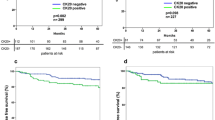Abstract
Purpose: This prospective study evaluates the diagnostic potential of Cytokeratin 20 (CK 20) RT-PCR for the detection of disseminated tumor cells in bone marrow and blood of a large cohort of patients with ductal adenocarcinoma of the pancreas and the prognostic value on overall survival prediction. Methods: Between 1994 and 2003, 172 patients (83 male, 89 female; 13–82 years) with pancreatic ductal adenocarcinoma underwent surgery. Bone marrow samples and venous blood were taken preoperatively and analyzed for disseminated tumor cells by nested CK 20 RT-PCR. Results: Disseminated tumor cells were detected in 81 (47.1%) of the 172 patients in the bone marrow and/or the venous blood. Overall, in 45 of the 135 (33.3%) bone marrow samples and in 52 of the 154 (33.8%) blood samples, CK 20 positive cells were detected. Detection rates increased with the UICC-tumor stage. According to Kaplan-Meier, univariate survival analysis of all 172 patients (n=78 R0-; n=18 R1- and n=5 R2-resected; n=71 palliative surgery) showed a statistically significant relationship of overall survival to radicality of the operation (P<0.0001), the UICC-stage of the tumors (P=0.0011) and the detection of disseminated tumor cells in bone marrow and/or venous blood (P=0.05). Patients with well- and moderately- differentiated tumors (G1 and G2) had a significantly longer survival (P=0.045) than patients suffering from poorly differentiated tumors (G3). A positive CK 20 status in the bone marrow and/or blood within the group of patients with G1 and G2 tumors had a significantly negative prognostic impact on their survival (P=0.046). Conclusions: Disseminated tumor cells can be detected in patients with pancreatic ductal adenocarcinoma by CK 20 RT-PCR. Detection rates are stage dependent, and survival analysis demonstrated statistically relevant data. From a clinical point of view, this finding is especially noteworthy for the group of well- and moderately-differentiated tumors.




Similar content being viewed by others
References
Aihara T, Noguchi S, Ishikawa O, Furukawa H, Hiratsuka M, Ohigashi H, Nakamori S, Monden M, Imaoka S (1997) Detection of pancreatic and gastric cancer cells in peripheral and portal blood by amplification of keratin 19 mRNA with reverse transcriptase-polymerase chain reaction. Int J Cancer 72:408–411
Ando N, Nakao A, Nomoto S, Takeda S, Kaneko T, Kurokawa, Nonami T, Takagi H (1997) Detection of mutant K-ras in dissected paraaortic lymph nodes of patients with pancreatic adenocarcinoma. Pancreas 15:374–378
Beger HG, Rau B, Gansauge F, Poch B, Link K-H (2003) Treatment of pancreatic cancer: challenge of the facts. World J Surg 27:1075–1084
Bramhall SR, Allum WH, Jones AG, Allwood A, Cummins C, Neoptolemos JP (1995) Treatment and survival in 13560 patients with pancreatic cancer, and incidence of the disease, in the West Midlands: an epidemiological study. Br J Surg 82:111–115
Brown HM, Ahrendt SA, Komorowski RA, Doffek KM, Wilson SD, Demeure MJ (2001) Immunhistochemistry and molecular detection of nodal micrometastases in pancreatic cancer. J Surg Res 95:141–146
Burchill SA, Bradbury MF, Pittman K, Southgate J, Smith B, Selby P (1995) Detection of epithelial cancer cells in peripheral blood by reverse transcriptase-polymerase chain reaction. Br J Cancer 71:278–281
Burchill SA, Lewis IJ, Selby P (1999) Improved methods using the reverse transcriptase polymerase chain reaction to detect tumor cells. Br J Cancer 79:971–977
Cameron JL, Pitt HA, Yeo CJ, Lillemore KD, Kaufmann HS, Coleman JA (1993) One hundred and forty-five consecutive pancreaticoduodenectomies without mortality. Ann Surg 217:430–435
Demeure MJ, Doffek KM, Komorowski RA, Wilson SD (1998) Adenocarcinoma of the pancreas: detection of occult metastases in regional lymph nodes by a polymerase chain reaction-based assay. Cancer 83:1328–1334
Fernandez-del Castillo C, Rattner DW, Warshaw AL (1995) Further experience with laparoscopy and peritoneal cytology in the staging of pancreatic cancer. Br J Surg 82:1127–1129
Heeckt P, Safi F, Binder T, Bücheler M (1992) Freie intraperitoneale Tumorzellen beim Pankreascarzinom-Bedeutung für den klinischen Verlauf und die Therapie. Chirurg 63:563–567
Hosch SB, Knoefel WT, Metz S, Stoeklein N, Niendorf A, Broelsch CE, Itzbicki JR (1997) Early lymphhatic tumor cell dissemination in pancreatic cancer: Frequency and prognostic significance. Pancreas 15:154–159
Kanemitsu K, Hiraoka T, Tsuji T, Inoue K, Takamori H (2003) Implication of micrometastases of lymph nodes in patients with extended operation for pancreatic cancer. Pancreas 26:315–321
Klöppel G, Solcia E, Longnecker DS, Capella C, Sobin LH (1996) Histological typing of tumours of the exocrine pancreas. WHO International histological classification of tumours, 2nd edn. Springer, Berlin Heidelberg New York
Konishi M, Kinoshita T, Nakagohri T, Inoue K, Oda T, Takahashi S (2002) Prognostic value of cytologic examination of peritoneal washings in pancreatic cancer. Arch Surg 137:475–480
Lüttges J, Schemm S, Vogel I, Hedderich J, Kremer B, Klöppel G (2000) The grade of pancreatic ductal carcinoma is an independent prognostic factor and is superior to the immunohistolchemical assessment of proliferation. J Pathol 191:154–161
Niedergethmann M, Rexin M, Hildenbrand R, Knob S, Stum JW, Richter A, Post S (2002) Prognostic impact of routine, immunohistchemical, and molecular staging in respectable pancreatic adenocarcinoma. Am J Surg Pathol 26:1578–1587
Ridwelski K, Meyer F, Fahlke J, Kasper U, Roessner A, Lippert H (2001) Stellenwert von Cytokeratin- und CA19–9 Antigen im immunhistologischen Nachweis disseminierter Tumorzellen in Lymphknoten beim Pankreaskarzinom. Chirurg 72:920–926
Roder JD, Thorban S, Pantel K, Siewert JR (1999) Micrometastases in bone marrow: prognostic indicators for pancreatic cancer. World J Surg 23:888–891
Soeth E, Röder C, Juhl H, Krüger U, Kremer B, Kalthoff H (1996) The detection of disseminated tumor cells in bone marrow from colorectal-cancer patients by a cytokeratin-20-specific nested reverse-transcriptase-polymerase-chain reaction is related to the stage of disease. Int J Cancer 69:278–282
Soeth E, Vogel I, Röder C, Juhl H, Marxsen J, Krüger U, Henne-Bruns D, Kremer B, Kalthoff H (1997) Comparative analysis of bone marrow and venous blood isolates from gastrointestinal cancer patients for the detection of disseminated tumor cells using reverse transcription PCR. Cancer Res 57:3106–3110
Tamagawa E, Ueda M, Takahashi S, Sugano K, Uematsu S, Mukai M, Ogata Y, Kitajima M (1997) Pancreatic lymph nodal and plexus micrometastases detected by enriched polymerase chain reaction and nonradioisotopic single strand conformation polymorphism analysis: a new predictive factor for recurrent pancreatic carcinoma. Clin Cancer Res 3:2143–2149
Thorban S, Roder JD, Pantel K, Siewert JR (1996) Epithelial tumor cells in bone marrow of patients with pancreatic carcinoma detected by immunocytochemical staining. Eur J Cancer 32:363–365
Van Heeck NT, Tascilar M, Beekveld JL, Drilenburg P, Offerhaus GJA, Gouma DJ (2001) Micrometastases in bone marrow of patients with suspected pancreatic and ampullary cancer. EJS0 27:740–745
Vogel I, Krüger U, Marxsen J, Soeth E, Kalthoff H, Henne-Bruns D, Kremer B, Juhl H (1999) Disseminated tumor cells in pancreatic cancer patients detected by immunocytology: a new prognostic factor. Clin Cancer Res 5:593–599
Wildi S, Kleeff J, Maruyama H, Maurer CA, Friess H, Buchler MW, Lander AD, Korc M (1999) Characterization of cytokeratin 20 expression in pancreatic and colorectal cancer. Clin Cancer Res 5:2840–2847
Yachida S, Fukushima M, Sakamoto M, Matsuno Y, Kosuge T, Hirohashi S (2002) Implications of peritoneal washing cytology in patients with potentially resectable pancreatic cancer. Br J Surg 89:573–578
Yeo CJ, Cameron JL, Lillemoe KD, Sitzmann JV, Hruban RH, Goodman SN, Dooley WC, Coleman J, Pitt HA (1995) Pancreaticoduodenectomy for cancer of the head of the pancreas: 201 patients. Ann Surg 221:721–731
Z’graggen K, Centeno BA, Fernandez-del Castillo C, Jimenez RE, Werner J, Warshaw AL (2001) Biological implications of tumor cells in blood and bone marrow of pancreatic cancer patients. Surgery 129:537–546
Author information
Authors and Affiliations
Corresponding author
Rights and permissions
About this article
Cite this article
Soeth, E., Grigoleit, U., Moellmann, B. et al. Detection of tumor cell dissemination in pancreatic ductal carcinoma patients by CK 20 RT-PCR indicates poor survival. J Cancer Res Clin Oncol 131, 669–676 (2005). https://doi.org/10.1007/s00432-005-0008-1
Received:
Accepted:
Published:
Issue Date:
DOI: https://doi.org/10.1007/s00432-005-0008-1




